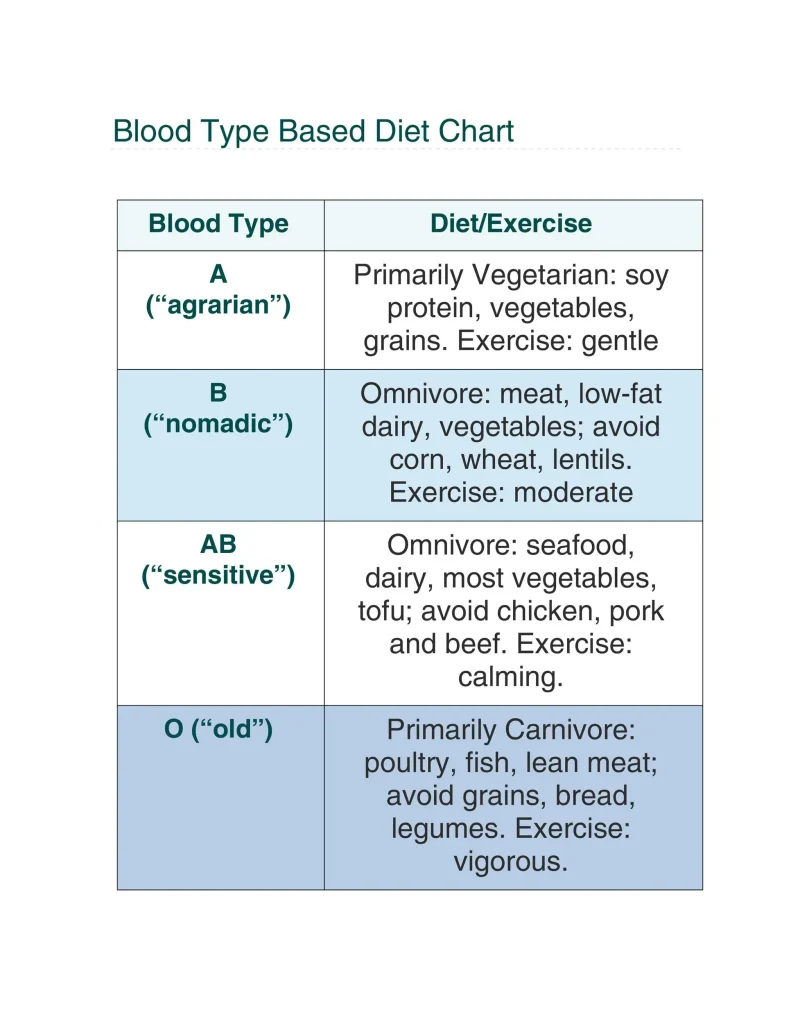The Blood Type Diet has gained renewed attention in recent years as individuals seek to optimize their health through personalized nutrition. This unique dietary approach, popularized by Peter D’Adamo in his book *Eat Right 4 Your Type*, proposes that tailoring your food choices to your specific blood type can lead to various benefits such as improved digestion and effective weight loss. Advocates claim that following the blood type diet can enhance overall well-being, with recommendations ranging from high-protein meals for type O to vegetarian options for type A. However, the scientific evidence supporting the blood type diet remains limited, sparking debate amongst nutritionists about its efficacy and potential dietary restrictions. As the conversation around eating for your blood type continues to unfold, it’s essential to explore both the advantages and drawbacks of this controversial dietary strategy.
The concept of a blood type-based eating plan, often referred to as personalized nutrition, has sparked curiosity and discussion in the health community. This approach posits that individuals can optimize their diets and health outcomes by aligning their food choices with their specific blood types. Proponents argue that such a tailored diet not only enhances digestion but also supports effective weight management and promotes overall vitality. While the dietary framework outlines specific foods for each blood type, the lack of robust scientific backing raises questions about its reliability. Exploring the implications of dietary restrictions linked to blood groups could ignite further dialogue on how personalized diets might benefit or challenge individual health.
Understanding the Blood Type Diet: An Overview
The Blood Type Diet, popularized by Peter D’Adamo, proposes that the foods we consume should align with our specific blood type. This concept suggests that each blood type has unique dietary needs that can influence digestion and overall health. For example, individuals with type O blood are advised to focus on protein-rich foods, while type A individuals are encouraged to adopt a vegetarian diet that includes an abundance of fruits and vegetables. This tailored approach captures the imagination of many who believe it can lead to improved health outcomes and a better quality of life.
The allure of the Blood Type Diet lies in its simplicity and the promise of customized nutrition based on genetic factors. While it seems logical to consider blood type as a determinant of dietary needs, experts caution that the relationship between diet and blood type might be more complex than what D’Adamo suggests. Despite its initial popularity, comprehensive scientific studies validating the diet’s effectiveness are scarce. Thus, those interested in eating according to their blood type should tread carefully, examining the nuances of nutritional science.
Frequently Asked Questions
What are the benefits of the Blood Type Diet?
The Blood Type Diet claims to offer several benefits, including improved digestion, better energy levels, weight loss, and reduced risk of diseases. Proponents believe that eating for your blood type aligns your diet with your genetic makeup, potentially enhancing overall health.
Can the Blood Type Diet help with weight loss?
Some individuals may experience weight loss when following the Blood Type Diet, particularly if it leads them to make healthier food choices and increase their intake of fruits, vegetables, and whole grains. However, scientific evidence lacks strong support for direct weight loss linked to blood type.
Is there scientific evidence supporting the Blood Type Diet?
Currently, there is insufficient scientific evidence backing the claims of the Blood Type Diet. A systematic review has not found studies demonstrating clear benefits, and any observed improvements in health metrics are likely due to dietary changes rather than blood type.
What are the dietary restrictions of the Blood Type Diet?
The Blood Type Diet divides diets based on blood types, with specific restrictions: Type O should eat high-protein foods and limit grains; Type A is encouraged to follow a vegetarian diet; Type B has more flexibility; while AB diets balance recommendations from A and B.
Who should consider eating for their blood type?
Individuals who typically do not consume enough fruits, vegetables, or whole grains may benefit from the Blood Type Diet by adopting healthier eating habits. However, it is essential to consult nutrition experts due to the diet’s restrictive nature and lack of nutritional balance.
| Key Point | Details |
|---|---|
| Popularity | The Blood Type Diet has resurfaced and gained popularity through social media platforms like TikTok. |
| Origins | Introduced in the 1996 book *Eat Right 4 Your Type* by Peter D’Adamo. |
| Diet Suggestions | – **Type O**: High-protein foods; limit legumes and grains. – **Type A**: Vegetarian diet; avoid meat. – **Type B/AB**: Balanced diet covering all food groups. |
| Scientific Evidence | No solid scientific evidence supports the effectiveness of the Blood Type Diet; benefits are attributed to general dietary patterns rather than blood types. |
| Potential Health Risks | People have varying health risks based on blood types: type O may have a lower risk for heart disease, while types A and AB may have higher gastric and pancreatic cancer risks. |
| Who Should Try It? | May benefit individuals who lack intake of fruits, vegetables, and whole grains, but is generally not recommended due to evidence lack. |
| Recommendations | Health experts suggest considering a less restrictive diet, such as the Mediterranean diet, which is better supported by research. |
Summary
The Blood Type Diet is a contemporary eating approach that aligns nutrition with one’s blood type, proposing various dietary guidelines based on this classification. While some individuals have found it popular and are investigating its benefits online, scientific proof remains insufficient to substantiate its claims. Experts advise a cautious approach and emphasize that overall healthy eating patterns may negate the importance of adhering strictly to a blood type-based diet. Alternative diets, such as the Mediterranean diet, are recommended for those seeking sustainable health improvements.



